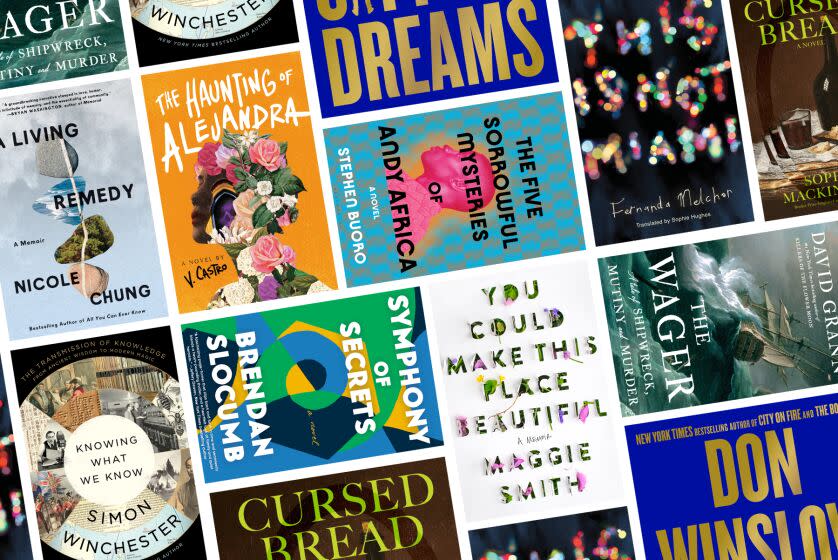10 books to add to your reading list in April

Critic Bethanne Patrick recommends 10 promising titles, fiction and nonfiction, to consider for your April reading list.
Spring has sprung, along with new books about dreams, nature and beauty, the raw materials of renewal. Whatever the genre that renews your spirits — mystery or history, poetry or prose — you’ll find it on our April list. Don Winslow offers the second installment in his “City” trilogy, Sophie Mackintosh examines a historical crime, Nicole Chung’s second memoir triumphs over grief, and Simon Winchester takes on nothing less than the human quest for knowledge. All of them involve high stakes: mutiny and trauma, transcendence and growth. The stuff of life. Read up.
FICTION
Cursed Bread
By Sophie Mackintosh
Doubleday: 208 pages, $27
(April 4)
Mackintosh’s Women’s Prize-nominated third novel carries the power of her first two, “The Water Cure” and “Blue Ticket.” It’s based on a 1951 mass poisoning in Pont-Saint-Esprit, France, that left 50 hospitalized and seven dead, all due to “bad bread.” Revenge? Accident? CIA hallucinogens? A feverish friendship between Elodie, the baker’s wife, and Violet, the wife of an American ambassador, both complicates and expands reality.
The Haunting of Alejandra
By V. Castro
Del Rey: 272 pages, $28
(April 18)
Alejandra has the perfect life: a husband, three children, a beautiful house in Philadelphia. But she’s living in the kind of quiet despair that will sound familiar to those who suffer from depression. When she finds a therapist who is, like her, of Mexican heritage, the women decide that Alejandra is possessed by La Llorona, a mythical spirit also known as “The Crying Woman.” As they pursue an exorcism, Castro keeps the suspense at a perfect pace.
The Five Sorrowful Mysteries of Andy Africa
By Stephen Buoro
Bloomsbury: 336 pages, $28
(April 18)
Andy Aziza has growing up to do, and it will involve anger and family secrets and a big first love. So far, so common. But “Andy Africa,” as he terms himself, lives in a Nigerian town torn between two faiths (Muslim and Catholic), and he takes on the theological language of the latter to explain his journey, making his eventual affair with a priest’s niece (come on, Eileen!) funny and poignant.
Symphony of Secrets
By Brendan Slocumb
Anchor: 448 pages, $28
(April 18)
Slocumb’s 2022 book, “The Violin Conspiracy,” focused on performance; this follow-up turns on composition, but it’s not a one-note theme. When a musicologist named Bern Hendricks receives a call asking if he can re-score famed composer Frederic Delaney’s long-lost opera, he agrees. Unfortunately, Hendricks will discover Delaney may not have written it. Did a Black woman named Josephine Reed compose all or part of it? Let’s find out.
City of Dreams
By Don Winslow
William Morrow: 352 pages, $30
(April 18)
Winslow takes Danny Ryan from 1988 Providence, R.I., to California in a whiplash-paced gangster thriller guaranteed to delight his fans. But caveat, fandom: Even for you, “City of Dreams” will feel as dark as a Moretti brother’s heart (yes, Peter and Paulie have roles in the new book). Ryan has plenty to deal with on the Left Coast, but also family obligations, which leave room for a glimmer of hope in the next book.
NONFICTION
A Living Remedy
By Nicole Chung
Ecco: 256 pages, $30
(April 7)
A sophomore memoir might be even tougher to write than a second novel, but Chung (“All You Can Ever Know”) has knocked it out of the park with her second book, detailing how she coped with the deaths of her adoptive parents before and during the COVID-19 pandemic. Read both books for a full accounting of how transracial adoption affects a person, but know that “A Living Remedy” stands on its own as an accounting of what it means to become an orphan.
You Could Make This Place Beautiful: A Memoir
By Maggie Smith
Atria: 320 pages, $28
(April 11)
Smith’s essay collection “Keep Moving,” a 2020 blockbuster (how often does that word modify “essay collection”?), informs this memoir about the end of her marriage and its effect on her children. In fact, its title is from the last line of Smith’s viral poem “Good Bones” (“Life is short, though I keep this from my children...”). The composition, including very short chapters, authentically conveys Smith’s poetic voice.
This Is Not Miami
By Fernanda Melchor
New Directions: 160 pages, $16
(April 4)
Melchor, whose novel “Hurricane Season” was nominated for the International Booker and the National Book Award, now writes nonfiction — if reportage blended with authorial imagination fits that category. Melchor sets 10 stories in and around Veracruz, based on real events but without verifiable details: a carnival queen-turned-killer, a purported witch, a meeting with a cartel. The stories are shocking, the prose shockingly good.
The Wager: A Tale of Shipwreck, Mutiny and Murder
By David Grann
Doubleday: 352 pages, $30
(April 18)
The shipwreck: 1740, the Royal Navy ship the Wager, off Brazil. The mutiny: up for debate, between two groups of survivors (no further spoilers). The murder: Suffice it to say a court-martial was assembled. Grann (“Killers of the Flower Moon”) employs his considerable narrative gifts in reconstructing an event that not only reveals the weaknesses inherent in military justice but also might help us understand the essence of imperialism.
Knowing What We Know: The Transmission of Knowledge From Ancient Wisdom to Modern Magic
By Simon Winchester
Harper: 432 pages, $35
(April 25)
Winchester has written about information systems before, as in his 1998 book “The Professor and the Madman,” about the making of the Oxford English Dictionary. In his robust new compendium, the author examines those systems in far grander scope, from mankind’s earliest attempts at language to the digital worlds we now keep in our pockets. This isn’t just a rollicking look back; Winchester asks what these systems do to our minds, for good and ill.
This story originally appeared in Los Angeles Times.

